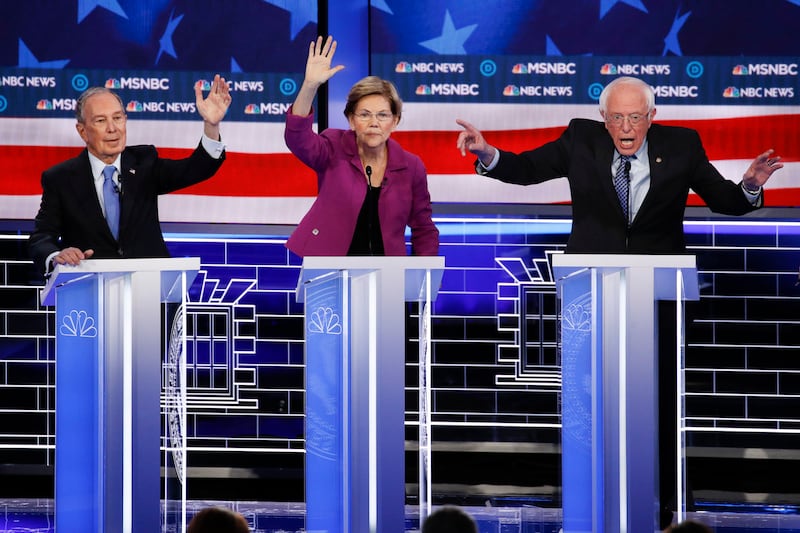Mike Bloomberg, according to NBC News, was treated as a “pinata.” Elizabeth Warren was “feisty.” The Hill noted that Bernie Sanders slapped down Pete Buttigieg’s attempts to attack him on union support. And Politico wondered how Bloomberg’s staff could have left him so unprepared for questions about his relationships with women and his record as mayor of New York City.
If you can find any serious talk about the pressing issues affecting the lives of American voters in all that, you must be hearing voices other than those who were on the debate stage in Las Vegas on Wednesday.
Politics, to quote an anachronism from the 19th century, “ain’t beanbag.” Personal attacks have been part of the American landscape since some of the nation’s founders began to campaign against each other. But in recent years, these attacks, regardless of party, have become the focus, and that’s not good for democracy.
At the start of Wednesday’s debate, moderator Lester Holt outlined the ground rules. Among other things, he said, “Now that the stage is narrowed to six candidates, we encourage each of you to directly engage with each other on the issues.”
All six promptly forgot the part about “on the issues.”
Oh, moderators did ask questions about global warming, health care, energy extraction, law enforcement, immigration, taxes and race relations. The answers occasionally shed a bit of light, but often the candidates spent time bashing other candidates’ positions, instead. And too many of the questions dealt with the candidates’ political viability and backgrounds, and whether Sen. Amy Klobuchar could remember the name of Mexico’s president.
The next day, all the talk was about who fired the best zingers and who stood up best under pressure.
We understand that character is a big part of a person’s qualifications to become the nation’s chief executive. Voters ought to know about Bloomberg’s nondisclosure agreements with women and Klobuchar’s voting record on judicial appointments, for example. But wisely choosing a president involves understanding much more than this.
Franklin D. Roosevelt said, “Democracy cannot succeed unless those who express their choice are prepared to choose wisely. The real safeguard of democracy, therefore, is education.” We have little doubt that voters, by November, will be well educated about the character flaws of each candidate. We hope they are equally educated about their positions on key issues of the day.
To that end, future debates ought to focus more on substantive issues. Here are some suggested topics:
- The federal government’s gross overspending spree. Despite a strong economy, Washington is on pace to spend well over $1 trillion more than it collects each year, and the national debt has soared past $23 trillion. Do the candidates perceive this as a problem? If so, how will they fix it? How can they enact their pet projects without making this worse? Given current spending, how could the federal government react effectively to an economic downturn?
- Religious liberty. Is this foundational freedom in the Constitution still important? Is it under attack? How would the candidates define it and protect it, not just in the United States, but as part of the candidate’s foreign policy?
- Foreign relations. President Trump has changed the relationship with the nation’s allies in Europe, Asia and the Middle East, even as he has used tariffs as a weapon. He has torn up the nuclear treaty with Iran, started a trade war with China and engaged in open dialog with North Korea. He replaced NAFTA. Have these been good or bad? How, as president, would the candidates engage these countries and protect the nation’s interests?
- Immigration reform. Sound bites about protecting families at the border and the pros and cons of a wall are nice, but how specifically would the candidates enact reform legislation in a Congress that increasingly looks to make this a wedge issue that helps each side raise money?
- Health care. How would your plan survive a withering political gauntlet and improve access to care without adding to the nation’s economic woes and robbing people of choices?
Each of these issues has been discussed to some extent, but the time has come to insist on less name-calling and more thoughtful answers. That will take concerted effort by moderators and candidates.
Given what is at stake, Americans should demand as much.

